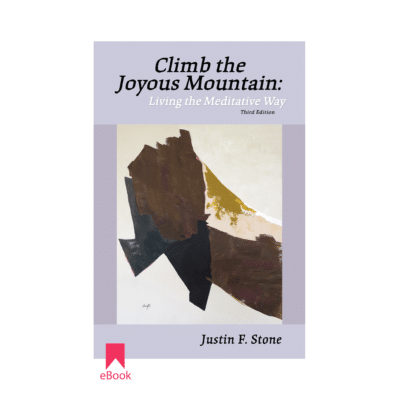
There is, in this writer, a sense of unworthiness in writing a book called Climb the Joyous Mountain. Once, when I mentioned the many errors in my life to the Bengali teacher, Rammurti Mishra, he immediately snapped, “Those are not your mistakes.” This statement really distinguishes the unreal from the Real, and I am grateful to Mishra for the profound lesson, although the sense of unworthiness insanely persists.
It seems that during much of my adult life I have been the fortunate recipient of many such lessons. When the wife of Zen Priest Ogata gave me a Zen lecture by saying, “Stone-san!” and then slowly letting her folded fist open and unfold as a flower unfolds, it made me want to cry. Surely she is one of the world’s great women.
Her husband, who spoke excellent English, once said to me, “Anybody can be the Small Hermit. Be the Big Hermit.” Much later, meditating in the foothills of the Himalayas, I thought of this and said to myself, “What am I doing up here being the Small Hermit? I should be able to do this at the corner of Broadway and 42nd Street.” I am grateful for these two lessons.
There has always been a dichotomy in my mind between the necessity of earning money on which to live and shrinking back from selling somebody something so that I could profit by it. In music, the only thing I wanted was a chance to express, but for some years in the stock market, I tried to put aside my reluctance and play by the rules of the game. There was some success but it was meaningless. Accumulation of money could not compensate for going against my own flow. And yet, we must work to live. The Buddha spoke of Right Livelihood. However, what is right for me might be wrong for another. How can we tell another what to do? We can ask meaningful questions and we can offer constructive examples, but we cannot define another’s life. To try to live what I AM seems to make sense. In the eyes of others, it often makes us look like fools. It is funny that when I dream at night, even today, it is usually about the musical period of my life. I have never dreamt about the stock market.
The anecdotes in this book are not here for the purposes of reminiscing. Rather, they point in the direction of the Joyous Mountain. A leap in the air, a clicking of the heels, or a really delighted laugh beats all the torturous discussion – without a doubt. But still we write books.
Does writing books make me a writer? I don’t know. Does writing about the Joyous Mountain make one joyous? I don’t know. What do I know? There have been moments at the piano when music flowed like T’ai Chi Ch’uan and moments of grace in athletics. But sports are competitive (and I was very competitive) and competition can be murderous. Looking back at some moments in South and Southeast Asia, when I was simply fortunate to be in a particular place, I realize how rich the fabric was (and is). After meditation, sometimes, we feel an inexpressible thankfulness. For what? To whom?
All one can do is bring the palms together in a salute to all beings. May they lose the attachment that makes for suffering. Life can be good – if we plant the proper seeds. The way of joy is best. Climb the Joyous Mountain.
Preamble
The commentary that follows was suggested by the painter, Ou Mie Shu, whose fine works are seen later in this book. It was written by Han Yu during the Tang Dynasty in China (which was roughly 600-900 A.D.).
Generally speaking, everything sings because of being abused. Grass and woods have no sound; they sing only when the wind interferes. Water has no sound of its own; it is the wind that makes it sing. It is jumping, skipping, running only because it was driven, stopped, or heated. Stone has no sound; it sings only when it is beaten.
Speech with man is the same. He speaks only because he has to. There are thoughts in his song and he tells his story when he cries. Whatever sounds come out of the mouth must all have their reasons. Music, so to speak, is the sound expressed without from what’s within. And it chooses the best instruments to sing for its soul. Metal, stone, string, bamboo, earthenware, leather, wood, pipes are the capable singers for nature. (The Chinese believe the internal organs have an urge to express. Only the proper instruments related to the internal organs can extend and express their need in music).
So nature treats its seasons, chooses its most skillful singers to express the time of year. Birds have been sent to sing in spring, thunder in summer, insects in autumn, and wind in winter. The four seasons push each other on. Each expresses all creation with its complaints in song.

